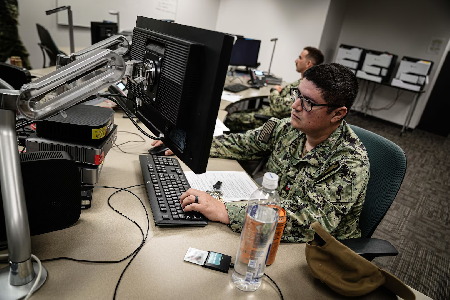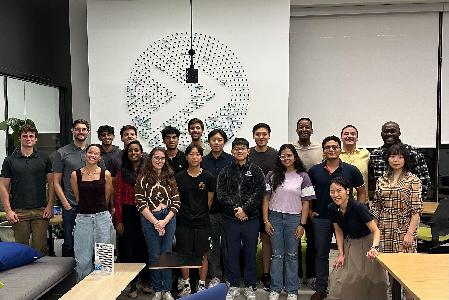An initiative formed by local businesses and universities to advance the D.C. region’s tech talent is launching a scholarship fund to help students from underrepresented backgrounds gain digital skills.
The Capital CoLAB, a tech-focused initiative of the Greater Washington Partnership, is launching the $5 million scholarship Digital Tech Credential Scholarship for Minorities and Women for up to 2,000 learners with $2,500 scholarships at local universities by 2025. Currently, 17 universities will be accepting the scholarship fund. Applications will open in fall 2021.
Working across the “mega-region” that spans D.C., Baltimore and Richmond, the CoLAB is taking aim at a tech skills gap in the region. It says there could be as many as nearly 60,000 unfilled IT, tech and digital roles annually in the area by 2025. To close it, the CoLAB is looking to create pathways to that workforce for groups that have low representation in tech, like women and Black Indigenous and People of Color (BIPOC). Jeanne Contardo, VP and managing director at the Capital CoLAB, said it’s important to send a “signal” to students from these communities that they are welcome.
“We know that students have been hit especially hard because of the pandemic, and so making sure that underrepresented students know that employers want them in this digital tech workforce, that they are vital and that we simply will not thrive as a region if we do not make sure that we are bringing people who have traditionally not been in these fields into this workforce, is really key,” Contardo said.
One of those pathways is called a digital tech credential. Offered by universities, it’s designed to give students a formal way to show employers they are prepared for roles in areas like data, cybersecurity and AI/machine learning. The CoLAB has worked with local employers to identify KSAs — or knowledge, skills and abilities — that they are seeking in new talent. When students complete the coursework associated with the credential, they can receive a badge to add to their LinkedIn profile or resume to show it has been completed.
The scholarship, Contardo said, is designed to allow students to take a course that they weren’t already planning on taking that’s part of the digital tech credential, and help to move them toward that pathway. The scholarship will also operate on a cohort model, where students who receive funding will interact with each other, and take part in programming to make sure employers are connecting with students. The CoLAB works with students and employers to make sure the firms that are hiring can be aware of the skills they’ve gained.

Capital CoLAB Managing Director Jeanne Contardo and GDIT President Amy Gililiand (Screenshot)
The scholarship is being funded by a group of corporate leaders in the region, including Deloitte, General Dynamics, Northrop Grumman Corporation Foundation and T. Rowe Price. Contardo said the CoLAB is also continuing to raise funds.
GDIT, which is the IT-focused arm of General Dynamics with a larger presence in Falls Church, Virginia and Baltimore County, has a third of its 30,000 employees based in the region that the CoLAB serves. The company is consistently seeking talent and has advised on the creation of the certification. Now it is helping to bring the scholarship to fruition.
“As I look across GDIT and the regional workforce, it does not reflect the rich diversity we have here in this area, and so more has to be done to make it an appealing and inclusive career choice for more young people,” said Amy Gilliland, president of GDIT. “We do have incredible universities in the region that we’ve been able to source our talent from in the past at GDIT, but I think if COVID has showed us anything it’s that the race for great technical talent is accelerating. We realize that we have to think differently about building our digital, technical community moving forward.”
The scholarship will be available to students at the following universities:
- American University
- Bowie State University
- Frostburg State University
- George Mason University
- George Washington University
- Georgetown University
- Howard University
- Marymount University
- Trinity Washington University
- Towson University
- University of Maryland
- University of Maryland Eastern Shore
- University of Maryland Global Campus
- University of Richmond
- University of Maryland Baltimore County
- Virginia Commonwealth University
- Virginia Tech
Before you go...
Please consider supporting Technical.ly to keep our independent journalism strong. Unlike most business-focused media outlets, we don’t have a paywall. Instead, we count on your personal and organizational support.
3 ways to support our work:- Contribute to the Journalism Fund. Charitable giving ensures our information remains free and accessible for residents to discover workforce programs and entrepreneurship pathways. This includes philanthropic grants and individual tax-deductible donations from readers like you.
- Use our Preferred Partners. Our directory of vetted providers offers high-quality recommendations for services our readers need, and each referral supports our journalism.
- Use our services. If you need entrepreneurs and tech leaders to buy your services, are seeking technologists to hire or want more professionals to know about your ecosystem, Technical.ly has the biggest and most engaged audience in the mid-Atlantic. We help companies tell their stories and answer big questions to meet and serve our community.
Join our growing Slack community
Join 5,000 tech professionals and entrepreneurs in our community Slack today!

A new model for thinking about how to grow regional economies: the Innovation Ecosystem Stack

Can the nation’s biggest cyber hub even handle Craiglist founder’s $100M security pledge?

20 tech community events in October you won’t want to miss



